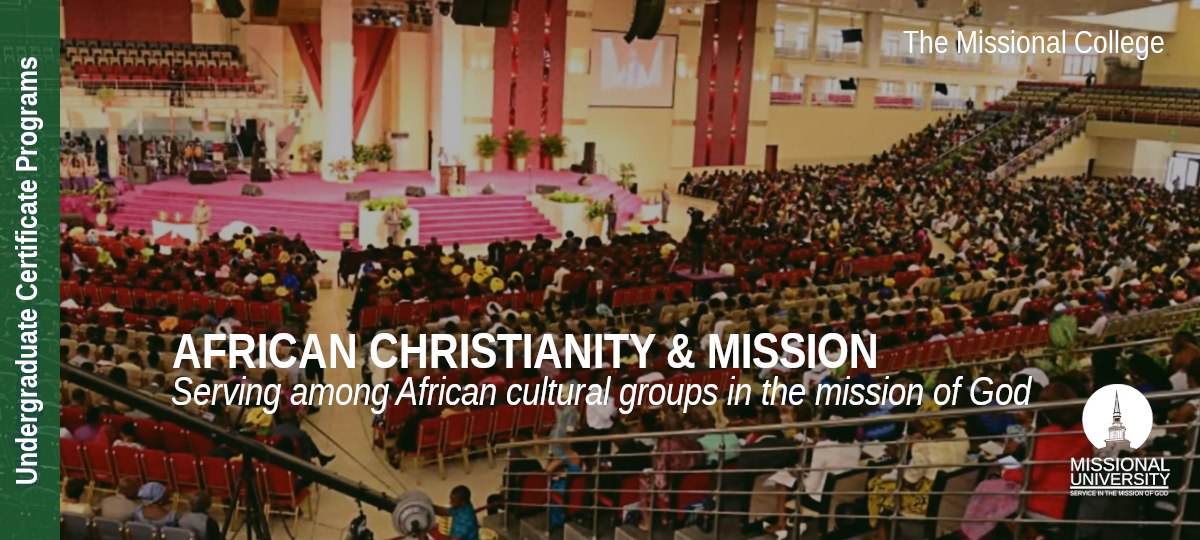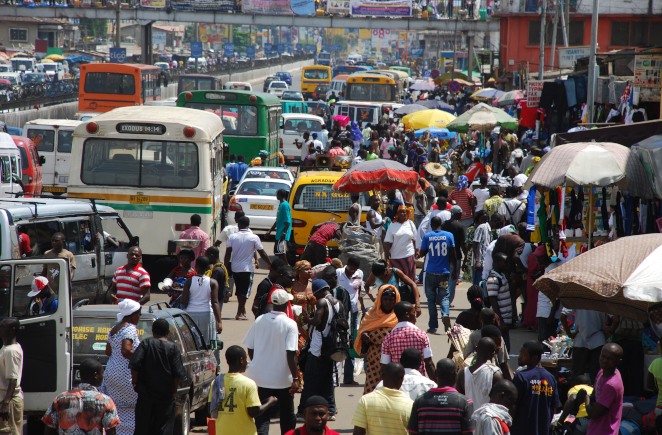
Online Undergraduate Certificate Program in
African Christianity & Mission
School: Missional College // Study Area: Serving Among Cultural Groups
☀ Totally Unique Program = only available at Missional University
Expand Your Intercultural Abilities Today!
REQUEST INFORMATION
Ready to learn more about the
Undergraduate Certificate in
African Christianity & Mission?
LEARN MORE NOW
The Undergraduate Certificate in African Christianity & Mission offers students an understanding of the history and growth of Christianity in Africa from antiquity to the present in areas that include: Christianity's relation to African political and social systems, the African roots of Christianity, African perspectives on biblical interpretation and theology, and African views of the relation between the gospel and African social issues. Through the certificate program, students gain the following capabilities:
-
- ability to develop a biblical and theological understanding of race and ethnicity and engage contemporary issues of racism, immigration, justice, and the refugee crisis on the African continent.
- ability to explore diverse forms of pre-colonial African civilizations and compare them to other developing world civilizations during the time period in terms of global trade, religious activities, cultural interactions, and the exchange of ideas and goods
- ability to distinguish cultural commonalities that African peoples share in the mist of linguistic and other kinds of diversity in the African experience as well as their effect on other cultures
- ability to articulate the African roots of Christianity and their contribution to global Christianity from the early centuries
- ability to articulate the unique theological and missional contributions that African Christianity makes to the global Christianity community
- ability to investigate African contextual theology and practice and their impact on issues such as polygamy, apartheid, social unrest, poverty, urbanization, etc.
According to the Center for the Study of Global Christianity at Gordon-Conwell Theological Seminary, Africa is critical for the future of global Christianity because in the next 10 years, Africa will likely grow to have the most Christians of any continent: 700 million. The United Nations Children’s Fund (UNICEF) projects that by the year 2050, the population of Africa under age 18 could be greater than 1 billion. Most of them will identify as Muslim or Christian. Both Christians from other countries who serve in Africa as well as Christian leaders within Africa need a clear understanding of the current state of African Christianity in relation to 21st century challenges and an understanding of the missional task going forward. The Undergraduate Certificate in African Christianity & Mission provides a framework for Christian leaders to make serious missional contributions to the future of the African continent.
Program Features
-
Integrated practicums allow you to gain valuable real-world experience
-
Learn from academic practitioners from around the world
-
Credits earned in this certificate program can apply to a Missional University Bachelor completion program
Course Effort
Course Length
Credits Required
Program Cost
What Will I Study?
We offer the most comprehensive approach to serving among cultural groups in the mission of God.
Examines the Biblical and theological understanding of human nature, specifically as it relates to race and ethnicity. Students will develop a theology of race and ethnicity that will prepare them to love their neighbors of all cultures as they engage contemporary issues such as racism, immigration, justice, and the refugee crisis.
This course sets out to answer the question: Did civilizations exist in Africa prior to direct contacts with Europeans in the late 15th century? The intent is to answer the question in the affirmative by exploring diverse forms of pre-colonial African civilizations defined in terms of complex political organizations and cultural formations comparable to other world civilizations. Since seldom do civilizations emerge in an absolute vacuum, we will emphasize both the local origins of African political and social systems while considering the extent to which African civilizations borrowed from and integrated external ideas. We will also explore evidence of Africa’s contributions to other world civilizations. Through trade and religious activities, Africa participated in the global exchange of ideas and goods. Thus, contrary to popular perceptions still prevailing in some quarters in the “West,” Africa was not isolated from the rest of the world until the era of European exploration, but rather, it was part of the world wide web of commercial and cultural interactions.
This course provides an understanding of the African experience throughout history with a general overview of centers of African Civilization from antiquity through contemporary times. The major themes covered include ancient Northeast Africa, Africa’s impact on Europe, Moorish civilization, the Golden Age of West Africa, Africa and the New World, the Swahili and Africa’s decline and resurgence. The course also provides introductory knowledge of the fundamental cultural commonalties that African peoples share in the mist of linguistic and other kinds of diversity. The course also examines the influence that African Civilization has exerted on other cultures as well as the impact of cross cultural contacts on the African experience.
There is a widespread belief among Christian believers and non-Christian observers alike that Christianity is a Western religion and was introduced to Africa by Western missionaries during the colonial period, but is this assertion true? This course attempts to explain and uncover the necessary evidence to prove beyond a doubt the African roots of the Christian faith and its contribution to the global Christianity.
The rapid growth of Christianity in Africa is accompanied by the surfacing of theological and missiological issues that can benefit the global church. With a reciprocal hermeneutics and exegesis with the global scholarly Christian community, African Christianity can make significant contributions in the following topics: Biblical anthropology, Christology, Pneumatology, the theology of suffering and theology of hope. The course explores these topics in depth.
After colonialism and the influence of Western mission began to decline, Africans have engaged to interpret the Word of God in the light of their own historical and cultural context. Transplanted theology and methodology during the colonial era did not scratch where Africans itch. When church liturgy, polity, preaching and teaching began to represent acceptable cultural forms the gospel began to take part in the core being of Africans. This course investigates how Christianity tackled the issue of polygamy, apartheid, social unrest, poverty, urbanization, etc.
Optional Additional Electives
An exploration of African traditional relgions, spirit possession, divination, mediumship, Islam, Christianity and religous encounters across the continent of Africa. The course evaluates the complex and multifaceted relationship between religion and culture and ways this intersection creates religio-cultural beliefs and influences religious practices. The course familiarizes students with research methods and identifies empirical and theoretical shifts in the anthropological, comparative, and historical study of religion in Africa.
The African continent has abundant natural resources, yet the continent has some of the poorest countries in the world and the quest for control over these natural resources has plunged the continent into many civil wars. This course will focus on the causes of this paradox by analyzing the root causes of this disparity. Special emphasis will be placed on an understanding of the natural resources in the African continent and the environmental socio-economic, and political impact of the exploration and exploitation of these resources.
The rapidly growing church in Africa is facing many opportunities and challenges. The conversion rate ratio is incompatible to the resource and methods of discipling the new believers. Hence, deep biblical knowledge of Christ and the mission of the church is hampered. Prosperity gospel preachers are mushrooming. The high unemployment rate among the young generation has become a breeding ground for radical Muslim terrorist and drug trafficking. Ethnic conflicts, child labor, gender inequality and the abuse and exploitation of women, the presence of Chinese and their influence are topics this course will cover.
Despite all the negative publicity about the political and economic conditions of the continent, Africa’s economy, commerce, global investment, the rise of consumers, is better than any time in African history. Access roads, electricity, education, and markets, mobile phones and social media are expanding rapidly. Improved health care and availability of medicines is reducing infant mortality and it is expected to create a baby boom that could increase the continent’s population to 2.4 billion by 2050. This course explains the economic growth in Africa and its ramification on the Christian movement.
When Can I Get Started?
We offer multiple start dates each year to give you flexibility in your education, life and work schedules.
JANUARY
MARCH
MAY
AUGUST
OCTOBER
A Career in Navigating Cultural Difference
Is this Your Mission?
Missionary, Church Planter, Community Ministry Practitioner, Immigration Services Coordinator, Community Worker, International Worker, Humanitarian Worker, Missional Team Leader, Global Director, Faith and Development Manager, Marketplace Ministry Worker, Children's and Youth Worker, Researcher
Request Information Now
How Much Will it Cost?
We offer tuition based upon country of residence. According to the Human Development Index, all countries around the world fall into one of four categories:
-
(Tier 1) - Very High Human Development
-
(Tier 2) High Human Development
-
(Tier 3) Medium Human Development
-
(Tier 4) Low Human Development
Our tiered global tuition makes higher education affordable for everyone world wide.

TIER COUNTRIES
100% Tuition
$395
per credit hour
3 credit course
$1185

TIER COUNTRIES
80% Tuition
$316
per credit hour
3 credit course
$948

TIER COUNTRIES
60% Tuition
$237
per credit hour
3 credit course
$711

TIER COUNTRIES
40% Tuition
$158
per credit hour
3 credit course
$474
Tiered tuition based on country of origin and scholarships available. Find your country of residence here for more information.
Tuition may be further reduced by participating in the Sponsorship Program.
